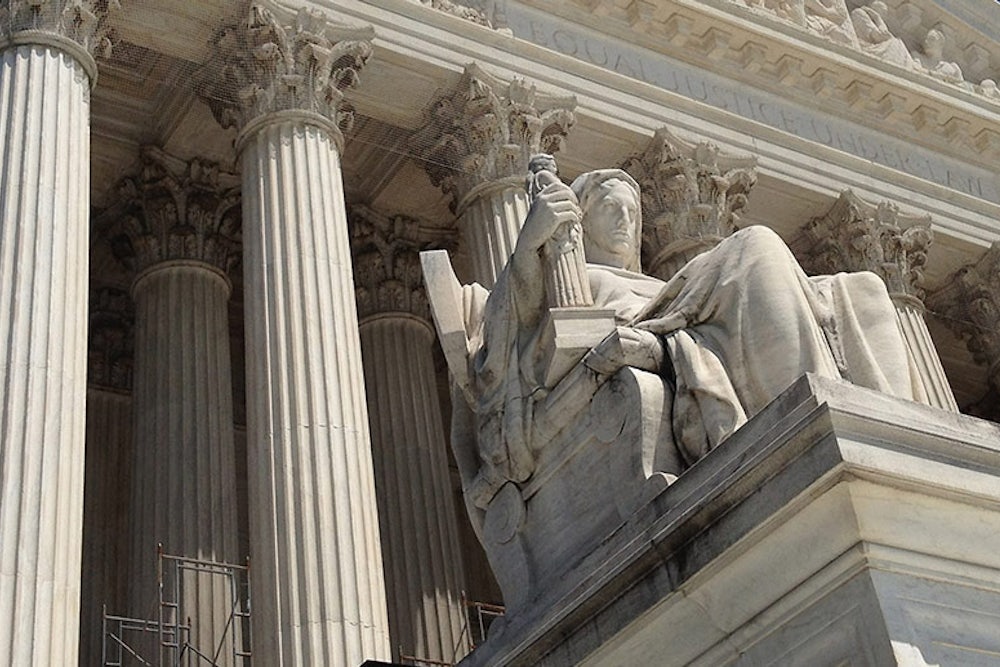The latest big legal challenge to the Affordable Care Act—the one that could potentially deprive millions of people of subsidies, making it impossible for them to get insurance—just suffered a major setback in federal court.
The Circuit Court of Appeals in Washington on Thursday announced that it is withdrawing its July decision, in which a two-to-one majority upheld the challenge, so that the full panel of active judges on the court can rehear the case. Federal appeals courts don’t grant this sort of “en banc” rehearing very frequently. They do so only when the stakes of the case are big and when they think the initial decision is suspect. (It takes a majority of active judges to grant such a hearing.) “At a minimum, it signals discomfort from a majority of the Court with the [three-judge] panel’s reasoning,” says Nicholas Bagley, a University of Michigan law professor who has followed the case closely and written frequently about it.
That doesn’t guarantee that a majority of judges on the D.C. Circuit will ultimately vote to overturn the initial decision. But there are many reasons to think that’s what will happen, for reasons that Ian Millhiser lays out clearly at ThinkProgress. The lawsuits’ architects claim that Obamacare authorizes the federal government to help people pay for private insurance only in those states that have taken it upon themselves to reorganize and operate new insurance markets. The basis for that claim is some ambiguous language in one key section of the law. The law’s supporters, including just about everybody who worked on the legislation or followed its journey through Congress, say that’s nonsense—the ambiguity is merely a drafting error, the kind that happens all the time in complex legislation. The law’s supporters also point to prevailing legal doctrine, under which courts defer to executive agencies when legal language is ambiguous.
The supporters’ arguments (which, as readers know, I support wholeheartedly) prevailed with federal trial judges who heard two of these cases initially. While that two-to-one majority on the D.C. Circuit overturned one of those verdicts, a three-judge panel from the Fourth Circuit upheld the other one—and did so unanimously. In other words, so far the arguments have convinced only two federal judges, both of whom happened to be Republican appointees. The majority of sitting judges on the D.C. Circuit are Democratic appointees and now, thanks to the en banc hearing, the case is in their hands.
The real significance of today’s announcement is how it affects the Supreme Court. The architects of the lawsuit had already petitioned the justices, asking them to take up the case and issue a final, authoritative ruling. (Simon Lazarus wrote about that request in these pages last week.) But the best pretext for the justices to take the case would be a split among Circuit Court rulings—i.e., one decision upholding the lawsuit and one rejecting it. As of this morning, that split no longer exists. One Court (the Fourth Circuit) has ruled unanimously to reject the lawsuit while another one (the D.C. Circuit) has decided to bring the case before its full panel of judges.
Most legal experts I know think the justices will, at the very least, wait to see how the full D.C. Circuit rules before taking the lawsuits seriously. The D.C. Circuit rehearing is set for November and that court probably won't issue a ruling until spring or summer of next year. If those judges end up reversing the decision, the Supreme Court justices might pass on the case altogether, although two other cases are in much earlier stages of the judicial process and could still produce conflicting rulings. As Andrew Koppelman, a constitutional law expert at Northwestern University, notes, “If the Court was going to blow up Obamacare, it would have done so in the big case in 2012. After Roberts paid a big political cost for doing that, why would he now adopt this hyper-technical and unpersuasive legal argument, yanking away benefits that a lot of people are already receiving?”
But remember: It takes only four Supreme Court justices to vote in favor of hearing a case. We know, from that 2012 Obamacare case, that four conservative justices were prepared to throw out not just the individual mandate but also the rest of the law. And as Jeffrey Toobin wrote recently for the New Yorker, at least one of those justices, Antonin Scalia, may be inclined to support the lawsuit for reasons of legal doctrine. Given all that, it's still possible the justices would decide to take up the appeal of the Fourth Circuit ruling immediately, as the lawsuit's architects have asked, without waiting for the D.C. Circuit to reach its verdict. The justices could also wait for the D.C. Circuit ruling and then take the case, even if the D.C. Circuit reverses the ruling. (That would be more likely if the D.C. Circuit splits on party lines.)
Those moves might be unusual and, needless to say, ruling in favor of the lawsuits would prove extremely controversial. But this Court has done some unusual and controversial things before.
